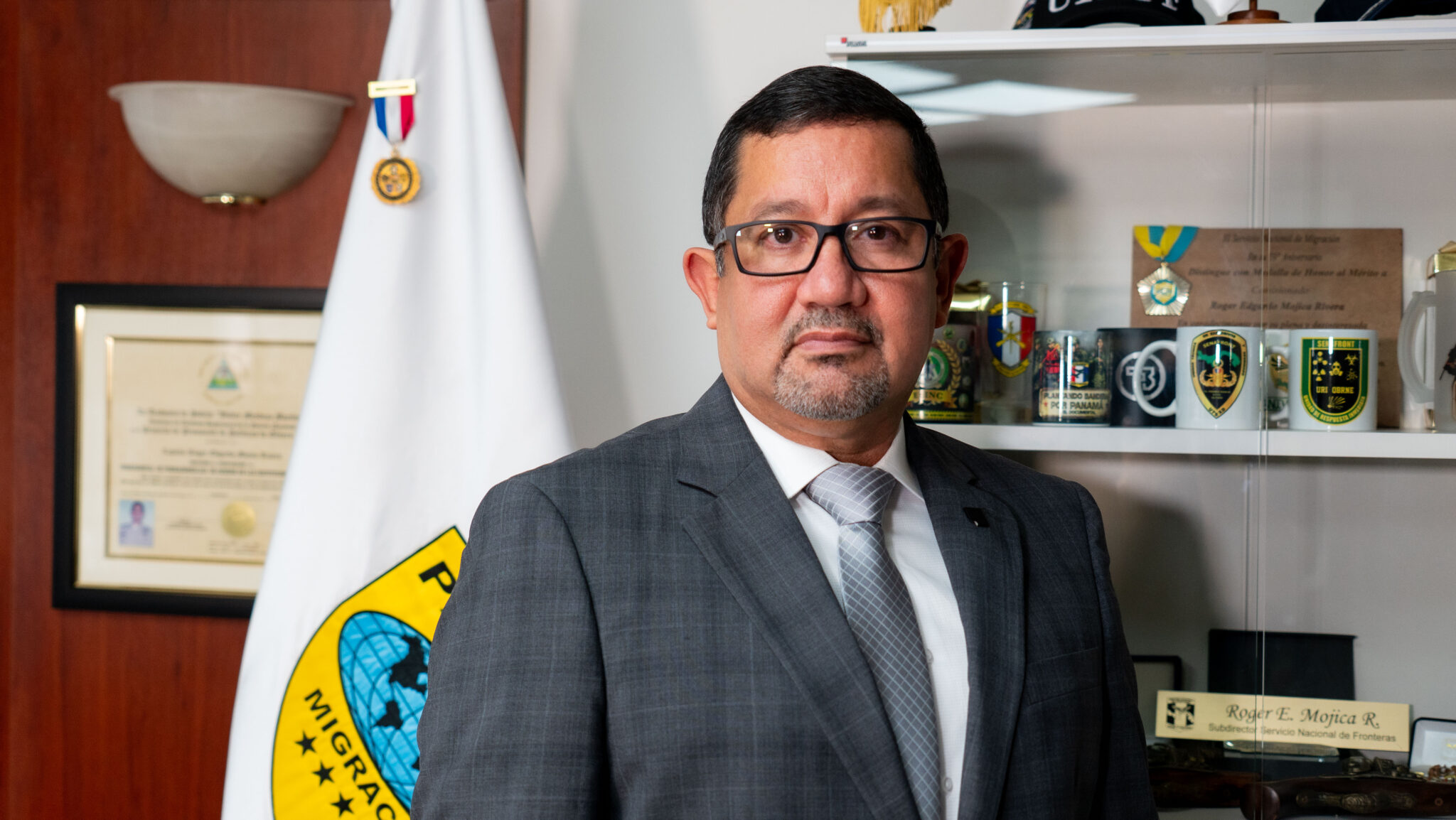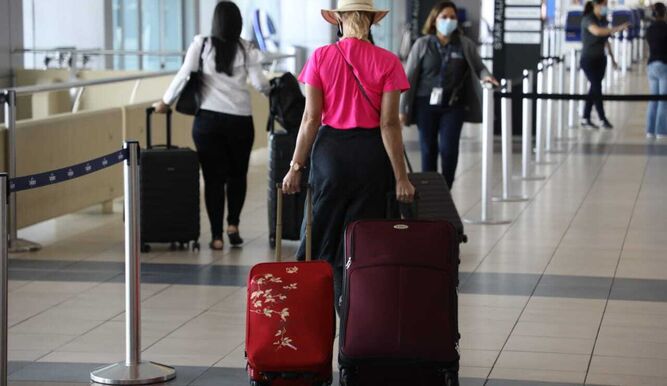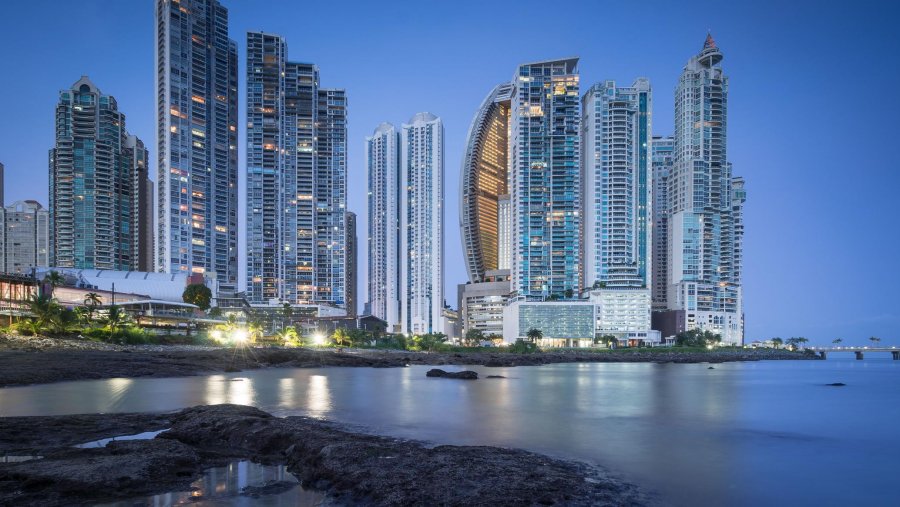The Mission of Panama’s Migration Service is Protecting Borders and Serving People
Roger Mojica Rivera, a veteran with more than three decades of experience in international relations, administrative management, and public security, is the current director of Panama’s National Migration Service. His extensive career includes significant involvement in immigration issues.

Having held key positions such as deputy director general of the National Border Service (SENAFRONT) and secretary general of the National Migration Service, Mojica brings a deep understanding of migration management to his current role. His qualifications are further underscored by a law degree and diplomas in security and human rights. Diálogo had the opportunity to speak with Director Mojica in an exclusive interview.
Diálogo: Since taking office in July 2024, what have been the main challenges facing the National Migration Service?
Roger Mojica Rivera, director of Panama’s National Migration Service: The main challenge we faced as an administration starting on July 1, 2024, was irregular migration, this flow coming from the south to the north, where years ago we had a flow of over half a million people who passed through Panama, in transit to the American dream, to the United States.
Controlling and managing that migratory flow was undoubtedly the main challenge for us all. The President of the Republic Raúl Mulino gave clear and precise instructions to close the borders with Colombia, obviously in a hypothetical way, because we know that it’s a dense tropical jungle and it’s impossible to close it physically. We established a series of controls in conjunction with the SENAFRONT where there were different routes being used by irregular migrants. We blocked several crossings, leaving only one open. It’s not the safest, but it was the least dangerous, and the SENAFRONT focused its constant patrols on providing security for the migrants. That was one of the first actions taken.
We also reinforced maritime security along the coast, both at the operational and information levels. We also began to disseminate campaigns, entitled, The Darién is not a Route (El Darién no es ruta), highlighting the dangers of making the journey.
We also signed a memorandum of understanding with the United States that allowed us to allocate funds for a series of deportations.
All of this, together with the change in U.S. policy, has allowed us to say that the flow of migrants has been reduced by 97 percent in annual comparisons and by 99 percent in monthly comparisons.
Almost no one is coming across our borders now. Recently, President Raúl Mulino and Minister of Public Security Frank Ábrego announced the closure of some of the camps. All the persons who are arriving are being processed and returned to Colombia, where they came from.
Diálogo: Closing the Darién Gap was a key mission of the National Migration Service and other security agencies for the safety of Panamanians and the migrants themselves. What is your main goal now?
Mojica: I divide it into two goals, one operational and the other administrative.
On the operational side, obviously, to maintain effective control of our border, establish mechanisms for orderly, safe, and regular migration, in the sense that the National Migration Service is also going to reinforce its physical presence on the streets, verifying that all foreigners who remain in our territory comply with immigration laws.
On the administrative side, the main project we are working on is a new headquarters for the city’s immigration service here. Currently, in the building where we are located, we have more than 700 employees. We are overwhelmed, we have problems with leaks, infrastructure problems, and there is no parking. This inconveniences all the neighbors because coming to immigration is difficult.
So that’s one of the main projects we presented to the President of the Republic. We are trying to leave that legacy, so that in three or four years, there will be a new headquarters built and designed for us, with all the necessary amenities, including parking and other required services, such as an office for the Ministry of Labor and a National Bank office, so that when you come to the building, you can leave with everything you need without having to go back and forth to different places.
Parallel to that, we also have another project to systematize and digitize processes and a new ID card system that can be verified through a QR code, which we have already started to implement.
Diálogo: What are the objectives of Migration for the rest of 2025 under the Ministry of Public Security’s Plan Firmeza?
Mojica: With the President of the Republic’s security plan, we are aligned as an institution subordinate to the Ministry of Security. We are focused precisely on the fight against human trafficking and smuggling. The objective is to coordinate with different agencies, at the international and national levels, to link and coordinate actions and make these operations we are carrying out more effective. All of this is aligned with Plan Firmeza, which was the policy proposed by the minister of Security.
Diálogo: What is the role of the Unit for Illicit Trafficking of Migrants (UATIN)?
Mojica: UATIN is a relatively new unit. It arose from the need we had as a country to coordinate or frame the entire process of combating human trafficking and smuggling with the various national and international authorities, including the care of those who are victims of trafficking. Once identified, these people are assisted by the National Migration Service, by qualified personnel, including psychologists and social workers, and we provide protection to all these people who are victims of this type of crime. This is an essential unit for guiding the strategy in the fight against these criminal organizations, as they are dedicated to profiting from human misery and need, which is a very lucrative business.
Diálogo: How do you fulfill your commitment to ensure the safety of Panamanians and foreigners in Panama?
Mojica: I am a career officer with 30 years in the Public Force. After my retirement, I was called to take on this leadership role. We are convinced that our work is focused on service, on providing better service in every way. As director of the National Immigration Service, I would like to leave a positive mark. We have a bad reputation in Panama, but with everything we do and everything we want to do, we want to leave behind an institution with a clean image, a renewed image, with better processes, better systems, transparency, and where users can come with confidence that they will not be mistreated or abused, much less taken advantage of because of their need to regularize their status as foreigners.
We have been able to help many people who today testify that “we have changed their lives;” many people tell us that. That’s my job; it’s what is expected of me, what I should do as a public servant. It’s also what we want to convey, to empower our subordinates. This is the line of work aligned with the national strategy of Plan Firmeza, but in the end, with that vocation of service that we are providing to our clients, who are foreigners, always within the framework of compliance with the law, which for me is what matters most.
Diálogo: How important has cooperation with the United States been in curbing irregular migration and fighting transnational criminal organizations that take advantage of vulnerable migrants and contribute to regional insecurity?
Mojica: Panama and the United States have a relationship of brotherhood, camaraderie, and historical collaboration, and this has not changed. Collaboration with the United States and its various agencies has been very harmonious.
With the signing of the memorandum of understanding, we have been allocated funds to carry out deportation flights, as required by law. This has allowed us to send a loud and clear message to the countries of origin that were sending people here. Panama is doing its part, following the guidelines of the President of the Republic to enforce the law and not allow us to continue to be used as a transit country, together with our allies.
I sincerely believe that all these efforts combined have given us the results we have achieved, with a 97 percent decrease in migration. The truth is that the collaboration has been extraordinary.
Diálogo: What types of agreements exist between Panama and the neighboring countries of Costa Rica and Colombia to manage irregular migration?
Mojica: We meet constantly with both countries. With Costa Rica, we initially maintained a program we call “Controlled Flow,” where irregular migration was channeled. We handed them over to Costa Rica, and they continued on and transferred the people to their borders. Throughout this process, both Panama and Costa Rica carried out biometric checks on the people who were transiting, and this has yielded many positive results in terms of people belonging to organized crime.
We have also requested this exchange of information from Colombia, but it’s a little more difficult for Colombia due to the particular nature of the terrain, the Colombian territory from which irregular migration originates.
The truth is that we have talked with the authorities. We are trying to coordinate, but we have not achieved effective results in this regard, unlike Costa Rica, with whom we do have a completely harmonious relationship of exchanges. We talk directly and carry out concrete operations in the fight against human trafficking and smuggling. The operational results and information exchange are much more fluid with Costa Rica than with Colombia in this regard.
Diálogo: What joint collaboration projects exist or are planned between the United States and Panama on migration issues?
Mojica: We maintain the memorandum of understanding. I understand that we were going to be allocated more funds to continue with deportation flights.
In parallel, for example, with U.S. Customs and Border Protection (CBP) and U.S. Homeland Security Investigations (HSI), we maintain ongoing coordination of training for our personnel, and we are waiting for proposals to become official so that we can continue with this process.
I think that it’s something that we have historically done, and I do not believe it will be suspended at this time.





